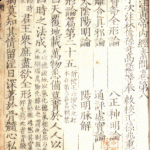 2000 years ago today, the year was AD 9. (on most calendars anyway) No cell phones, no cars, no health insurance. Things were pretty different, or were they? People still talked without cell phones, traveled without cars and got sick without insurance. What hasn’t changed in 2000 years is herbal medicine. Specifically, Chinese herbal medicine is not much different than what we use today.
2000 years ago today, the year was AD 9. (on most calendars anyway) No cell phones, no cars, no health insurance. Things were pretty different, or were they? People still talked without cell phones, traveled without cars and got sick without insurance. What hasn’t changed in 2000 years is herbal medicine. Specifically, Chinese herbal medicine is not much different than what we use today. 2000 years ago if you caught a flu (let’s say in China), you went to a local doctor and a cure was given in the form of bark, roots, stems and leaves. You took home a little bag, boiled your raw Chinese herbs in water and then drank the water. Many people around the world do the same thing today using the same herbal formulas used 2000 years ago. But does the world remember this history? In Asia and the East the answer is a resounding yes. The West where “modern drugs” have a foothold the answer is… the tide is turning. Finding herbal medicine, what’s often referred to as “Complementary and Alternative Medicine” (CAM) is getting easier.
One group supporting complementary medicine that has grown exponentially in just the last 10 years is The Consortium of Academic Health Centers for Integrative Medicine. This group includes traditional medical schools across the country. Members include Stanford, Yale, Northwestern, Duke University and from The Mayo Clinic in Minnesota across the country to the University of Hawaii. Forty four medical schools in the U.S. have recognized the value in integrating western medicine with other modalities including herbs, acupuncture and incorporating the mind, body and spirit into modern medical practices.
Their mission is to advance the principles and practices of integrative health care within academic institutions. They support and mentor academic leaders, faculty, and students to advance integrative health care curricula, research and clinical care. They also disseminate information on rigorous scientific research, which includes research on Chinese herbal compounds. (connect here to a research study done on Chinese herbal medicines for people with impaired glucose tolerance or impaired fasting blood glucose)
As is often said, history repeats itself. I think we’re returning to our roots. (no pun intended) Funny how the more things change the more they stay the same and Chinese herbal medicine is proving just that, even after 2000 years.
In case your interested The Consortium’s website is: http://www.imconsortium.org/

